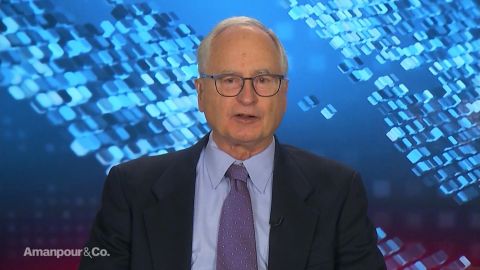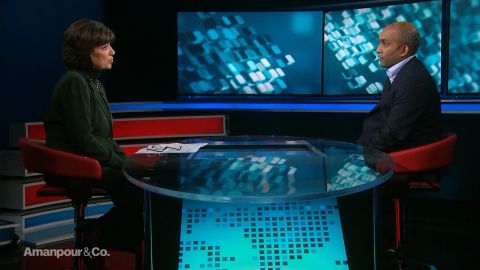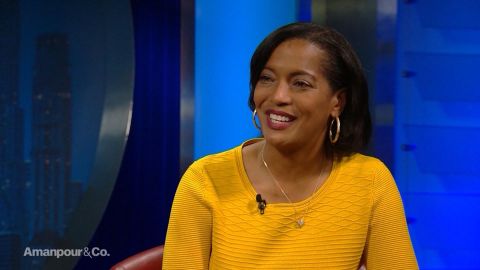Read Transcript EXPAND
MICHEL MARTIN, CONTRIBUTOR: Tell us a little bit about your story for people who aren’t familiar with it.
JAHANA HAYES, 2016 AMERICAN TEACHER OF THE YEAR: I think my story really frames my decision making and it’s the lens through which I view the world. I grew up in public housing. My grandmother raised my brother and I because my mother, other people in my family, struggled with substance abuse you know. It was a part of our life. It was a part of our community. We didn’t have much and that was — not much was expected. I got pregnant with my daughter. In high school, I had to go to an alternative program at 17 but my mom had me at 17 and my grandmother had her at 17. So just not a lot of hope [13:40:00] in that situation but —
MARTIN: It seemed normal to you?
HAYES: It definitely seemed normal. It definitely seemed normal. And I feel like as I got older and was exposed to more people, I realized that there were different ways of being and doing. And just took advantage of every opportunity I had to interact with people who were not similarly situated.
MARTIN: I was going to ask you about that. I mean you went on. You got your bachelor’s, you got your Masters and you got your certification.
HAYES: Yes.
MARTIN: Kudos. But I’m just wondering how it is or why you think you were able to keep going when a lot of other people faced with the same circumstances haven’t been able to do that. What do you think it is that kept you going?
HAYES: First of all, I knew I didn’t want that situation for my daughter. I know I wanted something different. It was so important to me to at least try. And there were many times where I didn’t even expect to succeed but I know I had to just try. And I think it was more for my daughter than for me.
MARTIN: How did it work at that age when you were 17? I mean you never dropped out of school as I understand.
HAYES: I went to an alternative program.
MARTIN: Went to a program. So what happened? Did you keep the baby with you or how did you manage all that?
HAYES: Well, I had an incredibly supportive family. My grandmother, my aunts, my mother eventuality but just didn’t really understand why I wanted to go to school so badly but were willing to help me, do whatever they could do. When I went to community college, I worked nights. I worked third shift. My grandmother came to my house, stayed with — I had two children at the time. And in the morning, I went to school full time. Just my family, people at my church just really were incredibly supportive even though what I was attempting to do was different than what they were used to. They know it was important to me so it was important to them.
MARTIN: Tell me about your teaching career. What do you teach and —
HAYES: My teaching career was 13 years at Kennedy High School which is one of the high schools in the same city where I grew up. I’ve taught U.S. History, World History, Comparative Government, Geography Civics and the Constitution. And I created an African-American History course in my school.
MARTIN: Why did you want to become a teacher?
HAYES: I think I was born to be a teacher. There was never a moment where I decided I want to be a teacher. I mean I was that kid who played school, who lined up dolls who just always did that. I put such a high value on the work that teachers did. All the teachers that I had interacted with or most of the teachers that I interacted with really believed in the profession and loved what they did. And it’s just who I thought I was supposed to be.
MARTIN: So tell me about being Teacher of the Year. What was that like?
HAYES: Well —
MARTIN: Did you get a crown?
HAYES: I got an apple. So —
MARTIN: A real apple that you could eat?
HAYES: A crystal apple.
MARTIN: Oh, a crystal. Oh, OK.
HAYES: Which is wonderful. Yes. But — so I was named the Teacher of the Year in, first my school, and then in our district. So the City of Waterbury, I was selected as their Teacher of the Year and Waterbury had never had a State Teacher of the Year. And there’s this process that starts application and then interview. It’s a long process. And then one person is selected.
(BEGIN VIDEO CLIP)
BARACK OBAMA, FORMER PRESIDENT OF THE UNITED STATES: Jahana, please join me to accept this award for America’s Educators, the crystal apple as the
National Teacher of the Year.
(END VIDEO CLIP)
HAYES: That’s the video that everyone sees at our ceremony where Obama named me Teacher of the Year. But I think what people don’t realize —
MARTIN: (INAUDIBLE).
HAYES: Well, for two reasons. Well, one of those reasons, my daughter was in the audience. So my family was there. And just the journey from, you know, being her mom to — I was the first person in my family to finish college. You know, my daughter went on to go to college. In the space of eight years, we went from no college graduates to a second generation college educated family. And my daughter was sobbing. And I was there as her mother, you know, being honored at the height of my profession which was unbelievable. As a black woman, it was just a tremendous, tremendous honor because I’ve said this before, there were only five African-Americans on that stage and three of them were me, the president, and the secretary of education. You know, I was saying, you know, excellence happens in these communities.
MARTIN: And so why did you decide to run for Congress? Did you have like a eureka moment where you’re like bagging groceries or were you like you know what?
HAYES: I did have a eureka moment. I was a teacher there during the transition of the two secretaries of education. And the incoming secretary, you know, the first time we were in a room together she made a comment that [13:45:00] she wanted to move government out of the way so that parents could make the decisions for their children. And I remember just thinking, but who would have me — who would have spoken for me? You know, I didn’t have a parent that could do that. I didn’t have a family who knew how to advocate for me. I was thinking isn’t that your job to make sure that education works, that kids can go to any school in this country and they’re good schools.
MARTIN: What do you think you add that isn’t already there in Congress?
HAYES: I think what I add or what teachers add is just that we have this tremendous ability to collaborate. You don’t pick and choose who comes in your classroom. Whoever’s there becomes your student and you work hard for them.
But I think the other thing that I add, and so many teachers, when I decided I was running, what I heard is “Well, all you know about is education” but education is not a single issue topic. You know, when kids come in my class, you hear when mom lost your job or I have to change schools because we’re moving because we can’t afford to live there or we lost our house or one of my parents is incarcerated or my grandma can’t get a visa or I can’t play sports because I didn’t get a physical because I don’t have health insurance. So we see directly how every single one of these policies impacted communities. So when people are talking about policies and dollars intent in the economy, we have the stories of families playing in our head because we know how families are being affected. And I think that there’s this added layer of empathy that comes along with my profession, that forces you to see beyond partisanship. And, you know, simple dollars and cents and policies and really how does this affect people.
MARTIN: In an article in “The Huffington Post” a couple weeks ago said that 1 in 500 teachers and other educators are running, I’m looking it up because I want to be sure I have the number right, are running for office this year. Why do you think that is?
HAYES: We saw that as a profession, we’re being held responsible for so many policies that we had no part in drafting or being a part of. When I was Teacher of the Year, oftentimes I’d travel to different states or be in different rooms talking about education policy. And I was the only educator or the only teacher in the room. I think we saw what happened in Oklahoma, in West Virginia, in Washington State where teachers came together and said, “We have to speak up for our profession.”
MARTIN: You’re referencing teacher strikes and protests?
HAYES: Mm-hmm. You know, we have to help people understand what it is that we do. And I think it just came to the point where we can’t wait for anyone else to do that for us.
MARTIN: There have been those famous movies about the newcomer who goes to Washington and wants to be different and wants to do things differently. And there’s always the sort of the moment when reality hits. And I wonder if you think about going to Washington and having Washington change you more than you change Washington.
HAYES: Well, I’m definitely not naive to that. But I think I’ve had so many challenges in my life that could have and sometimes should have left me angry or discouraged or disappointed. And I always chose an alternative route and it’s worked. It’s worked in my life. I’ve seen it work in the lives of hundreds, if not thousands, of young people. One of the things I say on my campaign all the time is that hope is the strategy.
MARTIN: Let’s say the Democrats take the House back and you are part of the House Democratic Majority. What’s your priority?
HAYES: My heart is in education. So I really think that we need to take some long hard look at the direction we’re going in education. But different than what people think, I think that we’ve done a lot of — we’re looking at education and the failures in education but so much of our focus has been on post-secondary education, getting kids ready for college and success through that track. We haven’t done enough with career readiness, with preparing a talented workforce for the next generation of jobs that are available, really celebrating working. You know, showing kids that there are multiple pathways to success. We talk about free college and that we’ll be in that direction but what about career training? What about make — I have so many young people who don’t enjoy school. Just as what it is, they don’t find success, they don’t feel valued. We really have to start to look at what are the jobs of the future and are we adequately preparing this generation, you know, for the jobs of the next 50 years? Clean energy jobs, you know, precision manufacturing, healthcare, all of those things where we have jobs in Connecticut that remain unfilled and students that are graduating at a much higher rate and not going to college, really bridging the gap on those two things.
MARTIN: Is there any way in which you do find common cause with the Trump administration? Because it strikes me that some of the educational policies being pursued by this administration are in alignment with that. They do believe in career training. They do believe in deemphasizing college as the main choice for most people. Are there any policies of the Trump administration that you actually do support?
HAYES: I think any policy that would benefit the people in my community. I mean I don’t care who the author is on that. [13:50:00] I think my main concern would be not removing the opportunity — not privatizing those opportunities, not removing the equitable access to those opportunities. We hear a lot about charter school and choice and all of those things but I recognize that for so many people, the school and their corner is their only choice. So making sure that all of those options are available to everybody is just very important to me. I think healthcare is another big issue in our district. A lot of people are very concerned about their insurance benefits, their Social Security, all of these things and just making sure that the people in my community are not disproportionately affected. You know, the environment, the hollowing out of the EPA is troubling for the people in Connecticut. We have some of the most beautiful landscapes and natural resources but we also have manufacturing communities from 50 years ago who rely on agencies to regulate, you know, what goes in the ground, you know, the remediation of some of these factories and buildings. That’s real. You know, these things are happening.
MARTIN: If elected, you’d be the first African-American woman elected from New England. Does that mean something to you?
HAYES: Well, Connecticut Democrats have never sent a person of color to Congress, period. I wasn’t even — I never even thought about that. But I can tell you, when I — the first time I read it in print, it was painful for me because I know that’s not the state that I live in. I know in Connecticut, I benefited from opportunities. There have been amazing people who are not minorities who have helped me. So this idea that, you know, we’ve never sent a representative and then there was a lot of criticism because, oh, its identity politics, that’s the only thing you want to run on. And I said, well, I can’t take this skin off. This is who I am. You know, my experiences are framed through this skin. All I’m saying is that all of these experiences are important and they matter. But I know for so many people, not just in the African-American community, but for so many people who have never seen themselves represented, it just is so incredibly powerful because you begin to at least imagine that maybe it’s possible.
MARTIN: Jahana Hayes, thank you so much for talking with us.
HAYES: Thank you. Thank you so much for having me here. Thanks.
MARTIN: Thank you.
About This Episode EXPAND
Christiane Amanpour interviews Sanj Srikanthan, Executive Director of the International Rescue Committee UK, about Saudi Crown Prince MBS’s role in the war in Yemen and author Fox Butterfield about his new book on the influence of family on crime. Michel Martin interviews Jahana Hayes, 2016 National Teacher of the Year and a Democratic Nominee for U.S. Congress.
LEARN MORE


